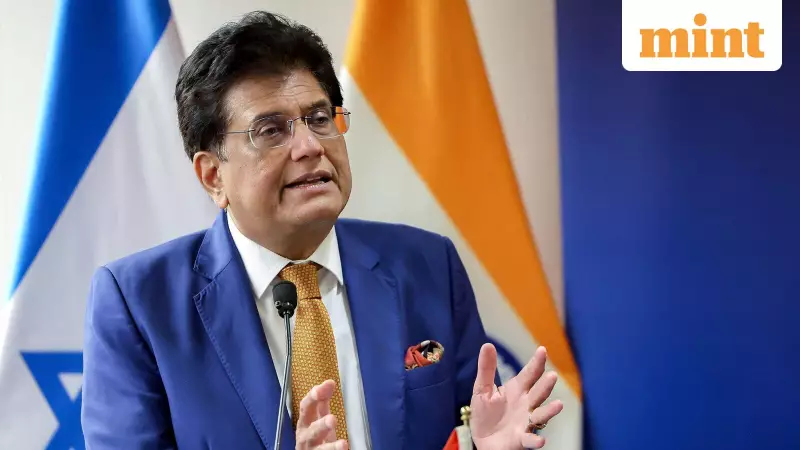
India and Israel are charting an innovative path for their proposed free trade agreement (FTA) by planning a two-phase implementation strategy aimed at delivering early benefits to businesses in both nations, according to Commerce and Industry Minister Piyush Goyal.
Strategic Response to Declining Trade Figures
The development comes at a crucial time when India's exports to Israel have witnessed a significant decline of 52% in 2024-25, dropping to $2.14 billion from $4.52 billion in the previous fiscal year. Imports from Israel also decreased by 26.2%, amounting to $1.48 billion during the same period, highlighting the urgent need for trade revitalization.
Both countries have recently finalized the terms of reference (ToR) to formally launch negotiations for the comprehensive trade deal, marking a significant milestone in their economic partnership.
What the FTA Framework Includes
The terms of reference encompass several key areas designed to enhance bilateral trade. These include market access for goods through tariff elimination, removal of non-tariff barriers, investment facilitation, simplified customs procedures, enhanced cooperation for innovation and technology transfer, and relaxed norms to promote trade in services.
"We are considering doing this in two tranches. A decision will be taken when the talks begin. Both ministers are keen to finalise the first phase early so that the trade community benefits sooner," stated Goyal, who is currently leading a 60-member business delegation in Israel.
Focusing on Low-Hanging Fruits First
The minister revealed that he and Israeli Economy and Industry Minister Nir Barkat have agreed to initially concentrate on the low-hanging fruits in the agreement rather than addressing sensitive issues that could delay the process.
"It is quite possible that we may come out with the first phase on an FTA, so that we can kickstart the benefits faster," Goyal emphasized, highlighting the practical approach both nations are adopting.
The collaboration will explore how innovation and research & development can drive greater investments between the two countries. The strategy involves working on joint projects where Israel can leverage its specialized skill sets while India offers the advantage of economies of scale through its massive market.
Massive Metro Project Opportunity
In a significant infrastructure development, Israel has released pre-qualification documents for a $50 billion metro project in Tel Aviv, featuring 300 kilometers of underground tunneling. Goyal expressed confidence in Indian companies' capabilities to participate in this massive undertaking.
"We have several players, both in the public and private sectors, who have done massive works. We have 23 cities which are setting up metros in India," he stated, adding that Israel would "very seriously" like India to be part of the project and hopes Indian companies will join the bidding process.
Diversifying Trade Basket
While bilateral merchandise trade has traditionally been dominated by diamonds, petroleum products, and chemicals, recent years have seen expansion into new areas including:
- Electronic machinery and high-tech products
- Communications systems
- Medical equipment
India's major exports to Israel include pearls and precious stones, automotive diesel, chemical and mineral products, machinery and electrical equipment, plastics, textiles, apparel, base metals, transport equipment, and agricultural products.
Meanwhile, imports from Israel consist of pearls and precious stones, chemical and mineral/fertilizer products, machinery and electrical equipment, petroleum oils, and defense, machinery, and transport equipment.
The two-phase FTA approach represents a pragmatic strategy to quickly address the recent trade decline while building toward a comprehensive agreement that could significantly transform the economic relationship between the two nations.






